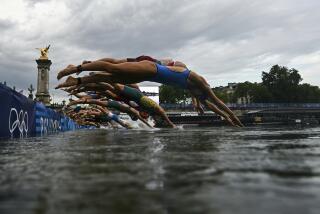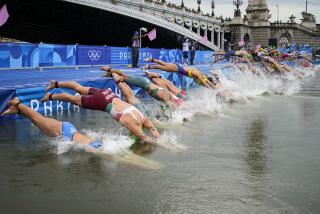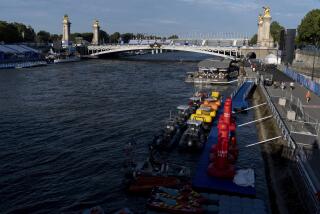Athlete Believes Good Things Come in Threes
- Share via
Andy Carlson, a competitive swimmer in high school and college, had a bit of trouble when he tried his first triathlon in 1989.
The race was fairly long: a 1-mile swim, 32-mile bike ride and 10-mile run. He finished the swim in good shape but started “dying” about 10 miles into the ride on his month-old bicycle.
He finished the race but “had a headache for three days after,” Carlson said about his rough introduction to the world of triathlons. But he got dramatically better: in 1990, he was named Rookie of the Year by Triathlete magazine.
The Irvine triathlete is one of a handful of professionals who make a living--though just barely--from the sport. Carlson did well enough in 1990 to garner some top sponsorships but was hampered this year by injuries (torn rib muscles and knee problems). While he managed a few thirds and fourths in major competitions this year, he vows to do better next season.
For Carlson, the training regimen during the triathlon season (May to October) is a grueling one. He gets up at 5:30 Monday through Saturday for a two-hour swim, has breakfast and then spends two to four hours on his bicycle. After an afternoon nap, he goes for a run.
A typical week, he said, works out to as much as 25,000 yards in the pool, 250 miles on the bike and 35 miles of running. Traveling to the big races can cut into his routine; he has competed in triathlons in Chicago, Baltimore and St. Croix, Virgin Islands, and elsewhere, part of an 11-city circuit most of the pros compete in.
“It’s fun. I enjoy it. You just get into a rhythm of packing and unpacking,” he said. Most of the time is taken up with preparation for the race--”You really don’t get to see any of the cities,” Carlson said.
Carlson tends to compete at the international or “Olympic” distance, opting out of the “ultra” distance events (such as the Ironman). As the sport of triathlon matures, most of the pros are specializing in a particular distance.
Swimming remains his strong suit; he needs to win the swim event decisively to have a shot at winning a triathlon, Carlson said. But while all triathletes have their specialty among the events, “you have to be really good in all three” to be competitive.
That’s part of the beauty of the sport, he believes: its celebration of all-around skill. Greg Lemond is probably the top road cyclist of the past five years, but Carlson said he could “beat him in a triathlon.”
More to Read
Go beyond the scoreboard
Get the latest on L.A.'s teams in the daily Sports Report newsletter.
You may occasionally receive promotional content from the Los Angeles Times.






